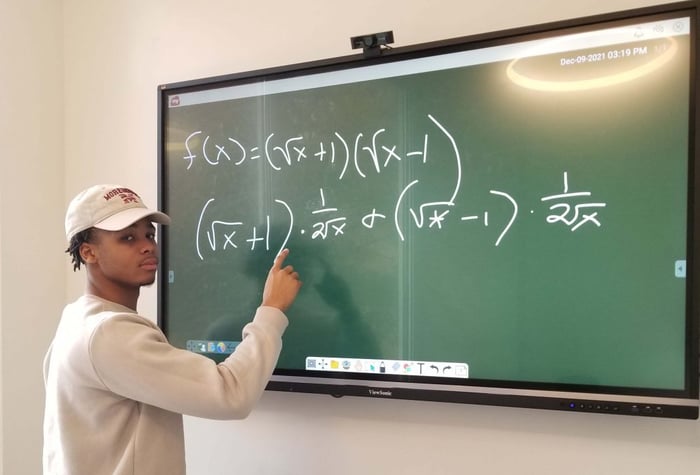
Nathan Alexander, PH.D.
Morehouse College
Science, Technology, Engineering And Mathematics Division Faculty
- Assistant Professor, Mathematics
Education
University of North Carolina at Chapel Hill
Bachelor of Arts, Mathematics and Sociology
New York University
Master of Arts in Teaching, Mathematics
Columbia University
Doctor of Philosophy, Mathematics and Education
Contact Dr. Alexander
Email
nathan.alexander@morehouse.edu
Office Location
Wheeler Hall, Room 309
Office Hours
Monday, Tuesday, Thursday, Friday
1 p.m. to 2 p.m.
About Dr. Nathan Alexander
Dr. Nathan Alexander explores the development of quantitative literacy in the contexts of Black history and futurity.
Nathan Alexander is an assistant professor of data science and interdisciplinary studies, and he teaches courses in mathematics, computational methods, and education. His work explores the development of critical and justice-oriented practices in quantitative literacy development. This work sits at the intersection of the humanities, social sciences, mathematics, and computational sciences, with a particular focus on Black history and futurity in national and global contexts. At Morehouse, he directs the Quantitative Histories Workshop, a community-centered teaching and learning lab for students and faculty in the Atlanta University Center.
-
RESEARCH INTERESTS

RESEARCH INTERESTS
- Mathematics
- Sociology of Education
- Mathematical and Statistical Modeling
See Also:
Current Research
- Mathematical Models in the Sociological Imagination
What if we re-imagined the meaning of “social justice” as a practice of possibility, one grounded in critical care , using evidence and data to show folks when things are awry, and practicing healing with ourselves and in community with others. What happens when you throw mathematics (the formal) and sociology (the intuitive) into the mix? You get mathematical models in the sociological imagination. - Speculative fiction, Afro-futurism, and the Mathematical Sciences
Building on the work of critical race theory, the Black Intellectual Tradition, and the mechanics of modern systems of inequity that utilize computational and mathematical practices, this project explores the role of speculative fiction in education, and specifically mathematics classrooms. How does mathematics allow us to be critical in the process of being descriptive, corrective, and prescriptive? - Human x Digital Networks for Mathematics Learning
This project explores a hybrid mathematics laboratory model that focuses on communication and social networks to explore how Human x Digital Networks and tools inform and improve mathematics preparation, assessment, and conceptual thinking in undergraduate settings.
-
PUBLICATIONS & PRESENTATIONS
PUBLICATIONS & PRESENTATIONS
- Alexander, N. N., Eaton, C., Shrout, A., Tsinnajinnie, B. & Tsosie, K. (2022). Beyond Ethics: Considerations for Centering Equity-Minded Data Science. Journal of Humanistic Mathematics, 12(2), 254-300.
- Alexander, N. N. (2022). A Legacy of Literacy: Mathematics Teachers and the Quests for Racial Justice. In D. C. Hucks, Y. S. Ruiz, V. Showunmi, S. C. Carothers, & C. W. Lewis (Eds.), Purposeful Teaching and Learning in Diverse Contexts: Implications for Access, Equity and Achievement (pp. 3-23). Charlotte: IAP.
- Alexander, N. N. (2022). [Exercises on the Quantification of Racial Injustices in the U.S.]. In W. K. Bell & K. Schatz (Eds.), Do the Work!: An Antiracist Activity Book. New York: Workman Publishing.
- Voigt, M., Hagman, J. E., Gehrtz, J., Ratliff, B., Alexander, N. N, & Levy, R. (Eds.) (2022, preprint). Justice through the lens of calculus: Framing new possibilities for diversity, equity, and inclusion. The Mathematical Association of America (MAA) Notes Volume. https://arxiv.org/abs/2111.11486
- Alexander, N. N. (2019). Critical Race Theory and Afrofuturism in Mathematics Education. In J. Davis & C. C. Jett (Eds.), Critical Race Theory in Mathematics Education (pp. 56-74). New York: Routledge.
- Alexander, N. N., Teymuroglu, Z., & Yerger, C. R. (2019). Critical Conversations on Social Justice in Undergraduate Mathematics. PRIMUS: Problems, Resources, and Issues in Mathematics Undergraduate Studies, 29(4), 396-419.
- Adiredja, A., Alexander, N. N., & Andrews-Larson, C. (2015). Conceptualizing Equity in Undergraduate Mathematics Education. In T. Fukawa-Connelly, G. Karakok, K. Keene, and M. Zandieh (Eds.), Proceedings of the 18th Conference on Research in Undergraduate Mathematics Education, 18(1), 60-73. Pittsburgh, PA.
- Leong, K., & Alexander, N. N. (2014). College Students’ Attitude and Mathematics Achievement using Web-based Homework. Eurasia Journal of Mathematics, Science & Technology Education, 10(6), 609-615.
- Alexander, N. N. (2013). Choosing a College. In H. Gould, D. Murray, & A. Sanfratello (Eds.), Mathematical Modeling Handbook: Volume 1 (p. 34-48). Bedford, MA: Consortium for Mathematics & its Applications (CoMAP).
- Alexander, N. N. (2013). Gender Inequality: Mathematics. In J. Ainsworth (Ed.), Sociology of Education: An A-to-Z Guide, SAGE Publications: London, UK.
- Gholson, M., Bullock, E., & Alexander, N. N. (2012). On the Brilliance of Black Children: A Response to a Clarion Call (Editorial). Journal of Urban Mathematics Education, 5(2), pp. 1-8.
-
FEATURED MEDIA
FEATURED MEDIA
- Equity in Data Science Education (June 2022). NC State Data Science Academy.
- Guest on S6E2 “Black to the Future” – United Shades of America with W. Kamau Bell (May 2021). CNN.
- Honoree – 1,000 Inspiring Black Scientists in America (January 2021). Cell Mentor.

RESEARCH INTERESTS
- Mathematics
- Sociology of Education
- Mathematical and Statistical Modeling
See Also:
Current Research
- Mathematical Models in the Sociological Imagination
What if we re-imagined the meaning of “social justice” as a practice of possibility, one grounded in critical care , using evidence and data to show folks when things are awry, and practicing healing with ourselves and in community with others. What happens when you throw mathematics (the formal) and sociology (the intuitive) into the mix? You get mathematical models in the sociological imagination. - Speculative fiction, Afro-futurism, and the Mathematical Sciences
Building on the work of critical race theory, the Black Intellectual Tradition, and the mechanics of modern systems of inequity that utilize computational and mathematical practices, this project explores the role of speculative fiction in education, and specifically mathematics classrooms. How does mathematics allow us to be critical in the process of being descriptive, corrective, and prescriptive? - Human x Digital Networks for Mathematics Learning
This project explores a hybrid mathematics laboratory model that focuses on communication and social networks to explore how Human x Digital Networks and tools inform and improve mathematics preparation, assessment, and conceptual thinking in undergraduate settings.
PUBLICATIONS & PRESENTATIONS
- Alexander, N. N., Eaton, C., Shrout, A., Tsinnajinnie, B. & Tsosie, K. (2022). Beyond Ethics: Considerations for Centering Equity-Minded Data Science. Journal of Humanistic Mathematics, 12(2), 254-300.
- Alexander, N. N. (2022). A Legacy of Literacy: Mathematics Teachers and the Quests for Racial Justice. In D. C. Hucks, Y. S. Ruiz, V. Showunmi, S. C. Carothers, & C. W. Lewis (Eds.), Purposeful Teaching and Learning in Diverse Contexts: Implications for Access, Equity and Achievement (pp. 3-23). Charlotte: IAP.
- Alexander, N. N. (2022). [Exercises on the Quantification of Racial Injustices in the U.S.]. In W. K. Bell & K. Schatz (Eds.), Do the Work!: An Antiracist Activity Book. New York: Workman Publishing.
- Voigt, M., Hagman, J. E., Gehrtz, J., Ratliff, B., Alexander, N. N, & Levy, R. (Eds.) (2022, preprint). Justice through the lens of calculus: Framing new possibilities for diversity, equity, and inclusion. The Mathematical Association of America (MAA) Notes Volume. https://arxiv.org/abs/2111.11486
- Alexander, N. N. (2019). Critical Race Theory and Afrofuturism in Mathematics Education. In J. Davis & C. C. Jett (Eds.), Critical Race Theory in Mathematics Education (pp. 56-74). New York: Routledge.
- Alexander, N. N., Teymuroglu, Z., & Yerger, C. R. (2019). Critical Conversations on Social Justice in Undergraduate Mathematics. PRIMUS: Problems, Resources, and Issues in Mathematics Undergraduate Studies, 29(4), 396-419.
- Adiredja, A., Alexander, N. N., & Andrews-Larson, C. (2015). Conceptualizing Equity in Undergraduate Mathematics Education. In T. Fukawa-Connelly, G. Karakok, K. Keene, and M. Zandieh (Eds.), Proceedings of the 18th Conference on Research in Undergraduate Mathematics Education, 18(1), 60-73. Pittsburgh, PA.
- Leong, K., & Alexander, N. N. (2014). College Students’ Attitude and Mathematics Achievement using Web-based Homework. Eurasia Journal of Mathematics, Science & Technology Education, 10(6), 609-615.
- Alexander, N. N. (2013). Choosing a College. In H. Gould, D. Murray, & A. Sanfratello (Eds.), Mathematical Modeling Handbook: Volume 1 (p. 34-48). Bedford, MA: Consortium for Mathematics & its Applications (CoMAP).
- Alexander, N. N. (2013). Gender Inequality: Mathematics. In J. Ainsworth (Ed.), Sociology of Education: An A-to-Z Guide, SAGE Publications: London, UK.
- Gholson, M., Bullock, E., & Alexander, N. N. (2012). On the Brilliance of Black Children: A Response to a Clarion Call (Editorial). Journal of Urban Mathematics Education, 5(2), pp. 1-8.
FEATURED MEDIA
- Equity in Data Science Education (June 2022). NC State Data Science Academy.
- Guest on S6E2 “Black to the Future” – United Shades of America with W. Kamau Bell (May 2021). CNN.
- Honoree – 1,000 Inspiring Black Scientists in America (January 2021). Cell Mentor.